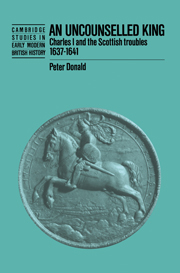Book contents
- Frontmatter
- Contents
- Preface
- List of abbreviations
- Note on the text
- 1 The king and his counsel
- 2 The king's troubles
- 3 The King's Commissioner
- 4 The king and war
- 5 A British problem
- 6 Parliaments and war
- 7 Projected settlements
- 8 An uncounselled king
- Bibliography of manuscript and printed primary sources
- Index
- Cambridge Studies in Early Modern British History
1 - The king and his counsel
Published online by Cambridge University Press: 20 October 2009
- Frontmatter
- Contents
- Preface
- List of abbreviations
- Note on the text
- 1 The king and his counsel
- 2 The king's troubles
- 3 The King's Commissioner
- 4 The king and war
- 5 A British problem
- 6 Parliaments and war
- 7 Projected settlements
- 8 An uncounselled king
- Bibliography of manuscript and printed primary sources
- Index
- Cambridge Studies in Early Modern British History
Summary
In a struggle deriving from alienation felt in church and in state the Scots offered a major challenge to kingship as Charles I understood it. At first they argued merely that the king was badly counselled – in general terms a line of criticism quite common in the Europe of the day, but a charge that could threaten far-reaching remedies. It was one that Charles I was singularly disposed to reject. A remedy pushed from below was to his mind more aggravation than cure. An assault on his authority deserved only the name of treason.
The challenge, which developed considerably through the period of his troubles, has attracted good attention in recent years from historians, although many questions undoubtedly remain. Charles's response has been less thoroughly dealt with, crucial though it was for the history of the period. How he managed in these crisis years is the principal concern of this study. Stability was no easy matter: built into the situation were problems of multiple-kingdom government undoubtedly relevant to the complex of troubles which Charles became obliged to face. His line towards the Scots illustrates clearly a style of operation which was ill-suited across all of his kingdoms at the time. The limited brief here of investigating the handling of the Scottish troubles has implications which range more widely.
The King of England, Scotland and Ireland enjoyed considerable authority in the early seventeenth century.
- Type
- Chapter
- Information
- An Uncounselled KingCharles I and the Scottish Troubles, 1637–1641, pp. 1 - 42Publisher: Cambridge University PressPrint publication year: 1990



